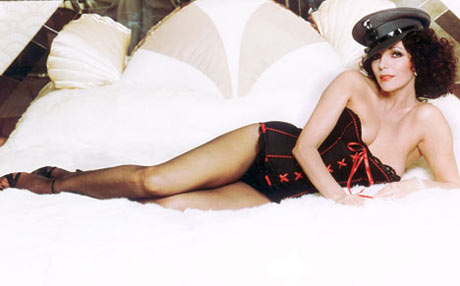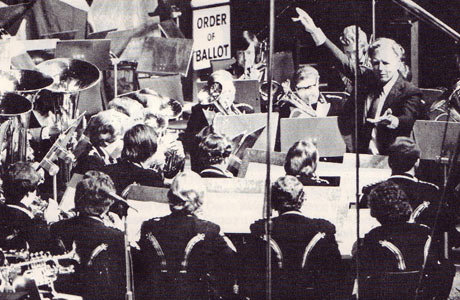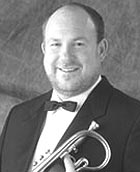2009 European Brass Band Championships - Own Choices - inspired or uninspired?
27-Apr-2009Picking the right own choice selection plays a huge part in winning the European title. Some chocies have had little to do with true music making however...
Picking an own choice selection to try and win the European title is like trying to get a top model to saunter down the cat walk wearing a designer outfit from Coco Chanel without the punters cottoning on to the fact that her jewellery comes from the Elizabeth Duke counter at Argos.

This is what it is all about: Picking an own chocie like our Joan....
The Stud
It’s all about showcasing strengths with the accoutrements of musical bling, whilst hiding the weaknesses by the application of the type of camouflage make up that makes Joan Collins look like she just walked out of the shower and plonked the drivers cap on in ‘The Stud’ again.
Call it what you want, but nowadays there are more smoke and mirrors used to fool audiences (and the judges) into thinking what they are hearing is nigh on impossible than even the late Ali Bongo could manage.
More obvious
Some are more obvious than others: ‘Journey to the Centre of the Earth’ sounded absolutely amazing when Black Dyke premiered it at Groningen a few years back, but after it was used at the Regional Championships, its secrets were revealed to be less ‘sci-fi’ than expected.
Bespoke
The rise of the ‘bespoke’ own choice test piece has become the norm.
Although ’Music of the Spheres’ was perhaps the first really ‘one off’ piece to be commissioned by a band for the contest, when David King asked Philip Sparke to write something tailor made for his Yorkshire Building Society Band in Glasgow in 2004, other less brazen attempts have been tried before.

Parkes points to Agincourt: Black Dyke decide on their own way of winning the 1978 Europeans...
1978
At the first European Championships in London in 1978 the organisers asked the competing bands to enter into the spirit of ‘European integration’ and to chose works that reflected that national characteristics.
With a certain degree of naivety, it certainly resulted in a few ‘premieres’ so to speak, although pieces such as ‘Canadian Impressions’ (played by the Belgians), ‘Suite Artica’ (the Danes), and ‘Norwegian Fantasy’ (played by the Irish!) seemed to show a liberal interpretation of the request. One piece was called ‘Herbstimpressionen’, whatever that meant…
English response
Black Dyke certainly opted for a very English response and stuck two fingers up to ‘Johnny Foreigner’ a la Battle of Agincourt by opting for ‘Connotations’. Their reasoning was assumed that as the piece was written for the National Championships of Great Britain the year before, then nothing could be more ‘nationalistic’. Sod the entente cordiale. They won.
From then on, the odd (and that is the right word) work surfaced every now and again – perhaps not specifically written as a vehicle to showcase a bands technical brilliance at the expense of musical integrity as some later offerings certainly did, but still ones that raised the odd eyebrow or two.
Prison work
In 1985 for instance, Brass Band Bienne from Switzerland performed ‘Changing Cells’ – not as one might have thought a musical plea for penal reform in the Cantons, but a piece of eclectic musical thought processing from the composer Fritz Voegelin. It didn’t escape the judge’s sentence of 9th place however, and is currently still locked up doing a long stretch in the band’s library.
Then of course all hell broke loose with Howard Snell’s arrangement of ‘Daphnis and Chloe’ in 1986 – not a ‘bespoke’ original of course, but a bit of immaculately redesigned tailoring that fitted Desford like a Saville Row suit.
Up went the cries of ‘foul play’ from beaten rivals – up went the musical one fingered response in return, although oddly the work didn’t win the own choice section of the contest.
End of the matter?
Many thought that would be the end of the matter – and the following years were packed with the ‘blockbuster’ heavy metal test pieces. A couple of interesting choices were made by bands though, such as, ‘Brass Metamorphosis’ in 1991 by James Curnow (played by Soli de Gloria) and ‘Stonehenge’ by Jan Van der Roost (Midden Brabant) - but it wasn’t until 2004 that someone deliberately opted for something very original and different.
 Music of the Spheres
Music of the Spheres
Yorkshire Building Society brought the house down with Philip Sparke’s, ‘Music of the Spheres’ – from the opening horn call played by Sheona White to the stratospheric soprano work of Peter Roberts (right). The piece fitted the band (and the MD) like a glove and they walked the contest by six clear points.
Forget the title and its inspiration – this was all about stella out of this world brass band talents showcased to the heavens. Nothing was ever going to be the same again, as the floodgates opened as bands and their MD’s tried to play catch up.
’Journey to the Centre of the Earth’ gave Black Dyke the chance to strut their stuff the following year (not surprisingly the piece had a soprano part written in the clouds to suit the band’s newly signed sop star Peter Roberts). It had all the necessary bells and whistle and even a tricksy bit techno whispering too.
Max Boyce
Meanwhile, in 2006 Cory opted for a piece of musical nationhood that couldn’t have been more Welsh even if it featured Max Boyce and the Treorchy Male Voice Choir.
Kenneth Downie’s ‘The Promised Land’ made the most of the band’s star talents (David Childs had the musical ball in his hands more often than Barry John) whilst the final climax perhaps had more to do with a journey to Cardiff Arms Park than it did with a Moses leading his people out of Egypt.
These two pieces did the business though – winning the own choice section of the contests (although it wasn’t enough for Cory to claim the overall title).
Different matter
In 2007 we certainly had a different take on the matter – two tailor made efforts that were cut from a very original bit of musical cloth indeed.
The Swiss of Treize Etoile went completely bonkers with ‘Beyond the Horizon’ by Bertand Moren (under the none de plume PH Kelly) – a piece of technical virtuosity that although brilliantly played numbed the mind as if being hit by a falling cuckoo clock.
Meanwhile, the Austrians of Oberosterreich opted for Mahler and ‘Titan’s Progress’ by Hermann Pallhuber – a piece of such wonderful ingenuity that it brought the house down in Birmingham, although the judges hated it and placed it 9th.
Remarkable
So too the following year, when the remarkable bit of playing on Betrand Moren’s ‘Dreams’ sounded like a nightmare to the men in the box (including David King no less) who placed it 10th.
We therefore await what response ‘Spirits of Puccini’ and ‘Standing on the Shoulders of Giants’ bring this time around.
PR guff
Nowadays, delivering something ‘new and groundbreaking’ – (the usual PR guff that accompanies such releases is a tiresome bit of banding propaganda) has no longer become ‘new and groundbreaking’ – although there has been the occasional exception.
If a band is to commission a work then you can be sure they are not going to leave it up to the composer to write something that isn’t going to suit them now are they?
Attack dogs
 That’s why ‘Music of the Spheres’ and ‘Journey to the Centre of the Earth’ could have been subtitled ‘Spotlight on Peter Roberts’, whilst ‘The Promised Land’ at times sounded like a Kenneth Downie Euphonium Concerto written for David Childs (right).
That’s why ‘Music of the Spheres’ and ‘Journey to the Centre of the Earth’ could have been subtitled ‘Spotlight on Peter Roberts’, whilst ‘The Promised Land’ at times sounded like a Kenneth Downie Euphonium Concerto written for David Childs (right).
You don’t rip the throat out of your competitors by muzzling you best attack dogs: You let them loose on their favourite diet of best musical fillet steak.
Bling and brilliance
Forget all that guff about musical integrity – to win the European you have to attack from the front and take no prisoners. Bling, brilliance and balls the size of a Grand National champion.
Volcanic pyrotechnics send the audiences wild (and no band will surely ever pick ‘Volcano’ as Black Dyke did in 1985 as their own choice ever again) - eruptions of volume and percussive effects seem to tickle the fancy. Forget the music - feel the power is the mantra.
As for the future?
Something to remember?
In the years to come, will we truly get something to remember – a new ‘Music of the Spheres’ or ‘Titan’s Progress’, or will we just be dished out yet another pyrotechnic display of virtuosity that impressive as it sounds really has very little musical value other than being a very clever means to a very specific end – winning the European contest.
We will have to wait and see, although we think it may well be a long time before we see another band come up with another piece called ‘Herbstimpressionen’…
Iwan Fox















